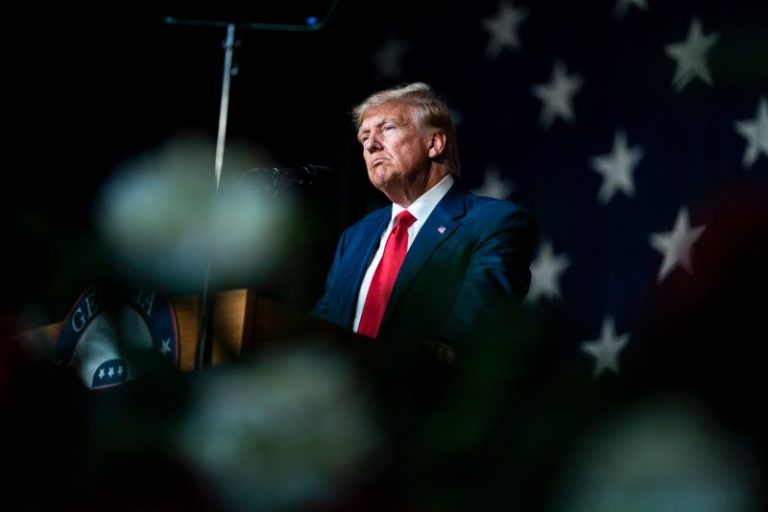ATLANTA — The Georgia Supreme Court unanimously dismissed former president Donald Trump’s petition to block an Atlanta-area district attorney from investigating him over allegations of 2020 election interference and to throw out evidence gathered by a special purpose grand jury in the case.
Trump’s attorneys had asked Georgia’s top court late Thursday to disqualify Fulton County District Attorney Fani T. Willis (D) and her office from further probing whether Trump and his allies broke the law when they sought to overturn Trump’s 2020 election loss in the state.
The Trump motion also sought to quash the final report of the special grand jury. It asked the Supreme Court to “stay all proceedings related to and flowing from the special purpose grand jury’s investigation” — a request made just weeks before Willis is expected to announce a charging decision in the high-profile case.
But in an opinion published late Monday, the nine-member Supreme Court dismissed the petition, writing that Trump had not proved the “extraordinary circumstances” that would warrant an intervention by the state’s top court. The decision said that the petition lacked proof that his constitutional rights had been violated; that “the facts or the law necessary” to remove Willis from the case exist; or that other courts had rejected his claims.
Trump’s Georgia-based lawyers — Drew Findling, Marissa Goldberg and Jennifer Little — filed near-identical petitions before the Georgia Supreme Court and Fulton County Superior Court last week repeating arguments made in a March filing seeking to block Willis from the case and quash the special grand jury findings. That earlier motion remains pending before Fulton County Superior Court Judge Robert McBurney, who oversaw the special grand jury.
In its opinion, the Georgia Supreme Court appeared critical of the Trump team’s decision to take its case directly to the state’s top court instead of first arguing the case before a lower court judge. “A petitioner cannot invoke this Court’s original jurisdiction as a way to circumvent the ordinary channels for obtaining the relief he seeks without making some showing that he is being prevented fair access to these ordinary channels,” the opinion reads.
The Supreme Court noted that Trump did not ask it to “compel” McBurney to issue a ruling. “Instead, he is asking this Court to step in and itself decide the motions currently pending,” the opinion reads.
“This is not the sort of relief that this Court affords, at least absent extraordinary circumstances that [Trump] has not shown are present here,” the court writes.
Justices for Georgia’s Supreme Court are elected for staggered six-year terms in nonpartisan elections, but the governor can fill vacancies by appointment. Eight of the nine were initially appointed by Republican governors.
Trump’s petition filed Friday in Fulton County Superior Court remains pending. It was not immediately clear how the top court’s opinion might affect that case, if at all. Findling, Trump’s lead attorney in Georgia, did not immediately respond to a request for comment.
Willis has indicated she could pursue indictments in the coming weeks — a case that is likely to include evidence gathered by the special grand jury. The panel, which did not have the power to issue indictments, issued a final report that remains largely sealed but is believed to have recommended multiple indictments.
The county district attorney wrote in a letter in April to local law enforcement and other officials that she planned to announce her charging decision between July 11 and Sept. 1, dates that coincided with the summer term of the latest Fulton County grand juries.
Willis appeared to narrow that window even further in another letter to Fulton County officials, announcing that much of her staff would work remotely at least four days a week between July 31 and Aug. 18 — dates coinciding with grand jury work. She also asked that no in-person proceedings be scheduled at the county’s courthouse during that period.
Last week, two grand jury panels were sworn in to hear criminal cases — one of which is likely to hear the election interference case.

